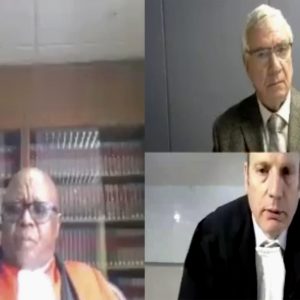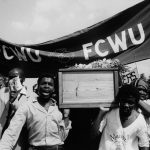Former security police continue to deny, deny, deny
The old Security Branch officers testifying at the reopened inquest into Neil Aggett’s death are sticking to their remarkably similar stories, the same ones they told at the original inquest.
Author:
15 February 2021

A week after the 39th anniversary of Neil Hudson Aggett’s death in detention, those members of the former apartheid police who were involved in his detention and interrogation continue to offer a wall of denials, convenient forgetfulness and a refusal to acknowledge the sanctioned brutalities that were an accepted part of their arsenal at the time.
They are obdurate in their insistence that they told the truth about what happened to the doctor and trade union activist at the official 1982 inquest, and they have no reason now to change the version of events they gave then.
Former security police officers may like to tell you in private that at the height of apartheid they were always one step ahead of their adversaries, that they possessed superior technology, better intelligence-gathering mechanisms and a God-given righteous purpose in their proud defence of the state against the evils of communist terrorists. But the picture they’ve offered in testimony before Judge MA Makume at the reopened inquest into Aggett’s death is far less flattering.
According to their own evidence, most of the men tasked with interrogating Aggett had no real information about his political activities. Neither were they in possession of potentially damning testimonies of other activists. And they did not have a clear idea of the bigger picture of the investigation that their superior, Major Arthur “Benoni” Cronwright, had gleefully crowed would result in the biggest treason trial in South Africa’s history.
Related article:
The frustration at their wilful ignorance of any dubious methods exercised by the Security Branch – revealed either at the time in media reports or subsequently during the Truth and Reconciliation Commission (TRC) hearings – and their inability to explain what they thought they were supposed to extract from Aggett and why, finally led Aggett family advocate Howard Varney to describe their account of the operations of the Security Branch as “monumentally incompetent, blundering and stupid”.
Aggett’s former interrogators are now in their 70s and 80s. They have claimed repeatedly that any interaction they had with him during a 60-hour period of intense interrogation from 28 January to 31 January 1982 was civil, polite, consisted of nothing more than repeated conversations and questions, and was simply undertaken as part of their jobs. This was in line, they have said, with the task assigned to them by Aggett’s now conveniently deceased chief interrogators, Cronwright and Lieutenant Stephan Whitehead.
Former Security Branch officer Daniel Elhardus Swanepoel, 72, spent almost two days insisting that Cronwright and Whitehead told him and fellow officer Johannes Nicolaas Visser (who earlier gave equally stubborn testimony to the inquest) to continue questioning Aggett and get him to fill in gaps in his statement with regard to his alleged involvement with the ANC and the South African Congress of Trade Unions.
According to Swanepoel, they did this by engaging politely in a 12-hour conversation with him. They were provided with no information or evidence to use to get Aggett to fill in the gaps, other than notes he had already made during his interrogation.
The missing four pages
Eventually, just as they were about to finish their shift, Aggett told them that he was finally “willing to tell the truth”. They did not ask him what this truth would be and, in spite of this seemingly important breakthrough, simply handed their detainee over to the officers who arrived to take over the next shift.
That “truth” would be taken down in a mysterious four-page addendum to Aggett’s statement in which he allegedly betrayed some of his comrades. The Security Branch continues to claim this must have been the impetus for the shame and guilt that led to his decision to commit suicide on 5 February 1982.
This four-page document was not produced at the original inquest, its contents cannot be recalled by those who saw it and no copy of it has ever been handed into evidence.
Related article:
Swanepoel was careful to point out that he realises now that some of the methods he used during interrogation in his long career as a Security Branch officer, such as enforced exercise, prolonged standing and the use of stressful body positions, were probably inhumane. But he never engaged in torture or physical assault, and was a “gentleman officer… soft-natured and decent” with a gift for making detainees feel at ease and telling him what he needed to find out over cups of coffee and cigarettes. Any detainees – such as Barbara Hogan, Ismail Momoniat or Cedric Mayson – who claimed that he was present and assisted in assaults on them during their interrogations are lying.
As to Hogan’s “close comrades list”, which provided the basis for the sweep of arrests that included Aggett, Swanepoel never saw it and had no knowledge of what the big picture was that Cronwright so firmly believed Aggett’s testimony played a vital part in painting.
Like his former colleagues, Swanepoel was unable to explain why the people Aggett had supposedly named were never arrested, interrogated or prosecuted as a result of his confession.
Loyal to the branch
Former officer Eddie Chauke also refused to acknowledge that he had anything to do with the assault or death of Aggett. According to the evidence of fellow detainee Auret van Heerden and Aggett’s own complaint of assault, Chauke was allegedly one of the officers present on 4 January 1982 when Aggett was forced to strip and run on the spot in a 10th floor office during interrogation, and later when he was assaulted by railway police officer James van Schalkwyk.
Hogan recalled that on the afternoon of 5 January 1982, she saw Aggett with Chauke as he was being returned to the cells at John Vorster Square. She noticed that Aggett’s shirt was torn and there were scratch marks on his arm. Chauke flatly denied that Aggett had ever been mistreated in his presence or that he had seen any evidence of assault and said that he had no involvement with him other than to take him from the cells to interrogation. Chauke would usually sit and read a newspaper while white officers took charge of what he has described as the innocuous, humane questioning and statements-writing that constituted these sessions.
Described in an affidavit by former detainee Jabu Ngwenya as “very loyal to the Security Branch” and one whom detainees “sometimes referred to as the ‘child of Cronwright’”, Chauke seems to have enjoyed a better relationship with his white superiors than other Black former officers and is apparently repaying Cronwright for his approval by steadfastly refusing to refute the version of events that was put before the original inquest.
Related article:
But private investigator Frank Dutton told the reopened inquest that a wary Chauke offered a very different version of events during an interview conducted with him in 2018. Chauke told him that “Aggett’s last interrogation was on the day before his death and it had left Aggett thoroughly downcast”. He added that “Whitehead had been angry with Aggett for opening an assault case against him. In a rage, Whitehead tore Aggett’s statement into pieces… Whitehead exclaimed that it was all lies and they would now get the truth out of him. Aggett was downcast as he hoped to be released soon.”
Chauke told Dutton that he had taken Aggett back to the cells after this, at around 3pm on 4 February 1982, and that Aggett “was visibly upset and depressed”. That was the last time Chauke saw Aggett alive.
A long shadow
When asked about this statement during his testimony, Chauke told Makume that he did not know Dutton and had never spoken to him, and that Aggett had been fine the last time he had seen him. What happened in the three years between his interview with Dutton and his appearance at the reopened inquest to make Chauke change his mind and present a version of events that sticks neatly to those offered by his fellow colleagues will probably never be known. It seems that the code of silence that was so much a part of Security Branch culture during the apartheid era continues to cast its spell over them well into the present.
Dutton’s evidence provided a long list of forms of torture and assault commonly reported by detainees that will hopefully help refute former security officers’ claims that they never engaged in or knew anything about torture and assault.
Related article:
It also paints a picture of the inept and unprofessional handling of the cell in the wake of Aggett’s body being discovered, an all-too-convenient failure to find any fingerprints other than one conveniently located above the kikoi he allegedly used to kill himself, and a general pattern of lies and cover-ups that became common practice among members of the Security Branch whenever they were called to testify before official inquests.
As Dutton notes in his affidavit, former Security Branch head General Johan van der Merwe testified before the TRC in 1998 that it was “expected of members of the South African Police and the South African Defence Force to stop the violent onslaught at any price, even if they had to act outside the law, as in a war situation”.
But if you tell that to Johannes Visser, Daniel Swanepoel or Eddie Chauke, they’ll just tell you that they “don’t know anything about that, can’t possibly comment, never heard anything like that”. As they will hopefully find out when Makume makes his findings in the coming months, even the most seemingly solid wall of silence and denial cannot withstand the force of the thousands of voices of truth and stacks of evidence that shout against it.
The reopened inquest continues. Proceedings are streamed live on the Foundation For Human Rights Facebook page.




